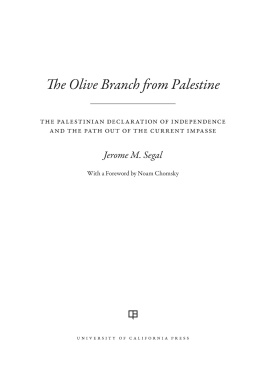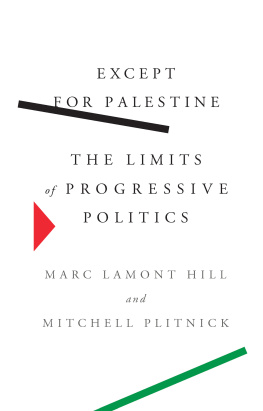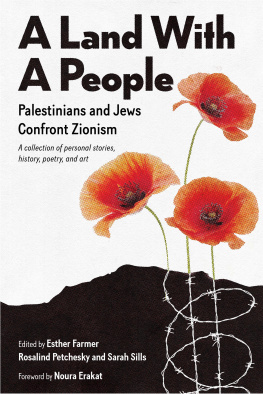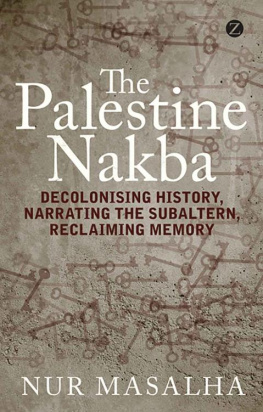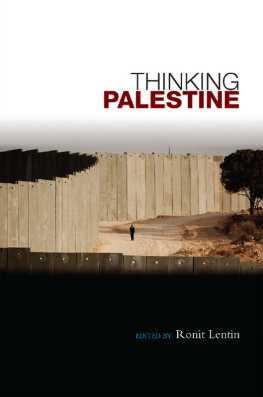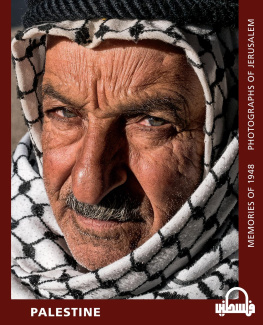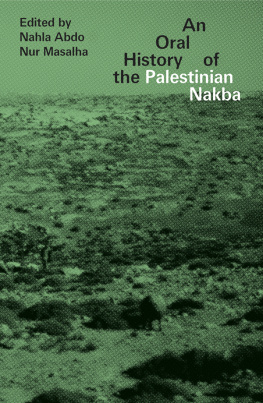Introduction
When I was a child , my grandfather would tell us about his shop in Yaffa, a business he owned with his brother until 1948 before being expelled to Egypt. He told us that, on their departure, they only packed a few days worth of clothes for him, his wife and children, having been told they would be able to come back as soon as it was safe. They left their sheets on the clothes lines, chickpeas soaking in water, and toys in the yard. He locked the door, put his key in his pocket, and headed to safety as instructed. They never returned, and his key stayed in his pocket until he died in Cairo sixty years later.
On the fifteenth of May 1948, Israel declared itself a new-born state on the rubble of Palestinian lives. In the months before and after this date, Palestinians were forced from their homes across the country; those who werent driven out fled in fear of execution, having heard of the horrors which took place during massacres carried out by the Haganah (Israeli militia) in villages nearby.1 This event would later, and begrudgingly, be known as the Nakba (or catastrophe), as Palestinians slowly came to terms with the fact that this was not a temporary displacement and that no one was going home any time soon. Eighty percent of Palestinians (over 700,000 people in total) were expelled, and their land taken over and occupied in what can only be described as an act of ethnic cleansing by the Zionist movement. They were all placed in refugee camps in Gaza and the West Bank, or in neighbouring Arab countries (Jordan, Syria and Lebanon), or displaced within the occupied lands of Palestine itself, now known as Israel.
Four generations on, any Palestinian child can tell you all about their great-grandfathers back garden in Haifa, Yaffa or Majdal. They can tell you about their great-grandmothers kitchen, the patterns on her plates, and the colours of the embroidery on her pillows. They can tell you about their great-grandparents neighbours, the musky smell of the local shop and all the handmade goods it sold. This child has never been to any of those places, of course, but so long as they keep the memory of them alive, then, should they ever get to go back, it would be as if they had never left; they could pick up exactly where their great-grandparents left off. Indeed, wherever Palestinian refugees are in the world, one thing unites them: their undoubted belief in their right to return.
Palestinian refugees are, in this sense, like nomads travelling across a landscape of memory. They carry their village in their hearts, like an internal compass where north is always Palestine. They pass this compass down to their children, who sketch in the details on an ever-fading map the hills and trees and wadis from their own imagination. Every day spent away from Palestine, in the life of a Palestinian refugee, is one that they believe brings them a day closer to their return.
The Nakba didnt end in 1948. It continued. With every brick built in this newly declared country; with every wall, watch-tower, gun-turret, or segregated road in the occupied West Bank; with every confiscation of land or demolition of Palestinian property (my own grandmothers 800-year-old farmhouse in Khan Younis was bulldozed as part of a security operation on 26 November, 2000); with every restriction on Palestinians ability to travel, and with every new attack on Gaza (what the Israeli Defence Force calls mowing the lawn); with each of these acts, the Nakba has continued. Israels seventy-year programme of systemic ethnic cleansing is one long, ongoing extension of the event that took place in 1948, the origin of which lay in the liberties that Israel took that year when Zionist militias, supported by the British, took more than 78 percent of the Palestinians land. Since then, countless Israeli government policies have furthered this gradual ethnic cleansing, building on the more comprehensive land-grab accomplished in 1948, and again in 1967. The ideology that continues to underpin the legalised destruction of houses in Jerusalem and settlement areas in the West Bank, and the slow strangulation of Gazans (through the now twelve-year-old blockade) is the same ideology that first destroyed 531 villages and eleven cities in 1948, an ideology that transforms each Palestinian into a potential target, myself and my two-year-old daughter included.
This ongoing Nakba is also continually evolving. We are forever entering new stages of it, whether its the isolation of Negev Bedouins into smaller and smaller ghettos, the further separation of the Gaza and West Bank governments, the use of explosive bullets in the shoot to cripple response to last years March of Return, or the subjection of Palestinians in Jerusalem to increasingly restrictive, discriminatory policies.2 These systematic aggressions towards the Palestinian people continue on a daily basis in countless small, localised cases, making it difficult, or simply too unspectacular, to report on. Yet they are all part of a process that began in 1948.
You can see the repercussions of the Nakba throughout the diaspora in the neighbouring Arab countries, where refugees first fled, and beyond (as of 2003, there were 9.6 million descendants of Palestinians living outside Palestine). Its influence is not just geopolitical, but also profoundly cultural. When Palestinians write, they write about their past through their present, knowingly or unknowingly. Their writing is, in part, a search for their lost inheritance, as well as an attempt to keep the memory of that loss from fading. In this sense, the past is everything to a Palestinian writer; it is the only thing that makes their current existence and their identity meaningful. And the Nakba, of course, sits at the heart of this. Whether it is Jabra Ibrahim Jabras novels, A Cry in a Long Night or In Search of Walid Masoud, or Ghassan Kanafanis Men in the Sun or Returning to Haifa, Palestinian authors have all felt obligated to, as well as inspired by, the Nakba. They have a cultural duty to remember it.
It is perhaps for this reason that the genre of science fiction has never been particularly popular among Palestinian authors; it is a luxury, to which Palestinians havent felt they can afford to escape. The cruel present (and the traumatic past) have too firm a grip on Palestinian writers imaginations for fanciful ventures into possible futures.
Another reason why science fiction might not have been popular among Palestinian writers is it doesnt offer an obvious fit to the Palestinian situation. In classic SF, the battle lines are drawn quickly and simply: the moral opposition between a typical SF protagonist and the dystopia or enemy he finds himself confronting is a diametric one. But in Palestinian fiction, the idea of an enemy is largely absent. Israelis hardly ever feature, as individuals, and when they do, they are rarely portrayed as out-and-out villains. In Ghassan Kanafanis Returning to Haifa, for example, we follow the unlikely visit by two Palestinians, Said and Safeyya, to the city they fled twenty years earlier, where they get to know the Israeli woman, Miriam, now occupying the house that was stolen from them. Instead of portraying her as a zealot, a woman self-convinced of her peoples holy right to the land, Kanafani presents us with a sensitive, compassionate individual, someone who, when confronted by it, is ashamed of what her people did to the Palestinians.
The absence of an enemy isnt the only absence in Palestinian fiction. You might even say absence generally is one of the defining features of Palestinian fiction which is where science fiction might be able to contribute. Absence, and the feelings of isolation and detachment that come with it, are easy to magnify in a context of galloping future technology. In the twelve stories specially commissioned for this project, absence is everywhere. In Saleem Haddads Song of the Birds and Rawan Yaghis Commonplace, young protagonists are haunted by the voices of their dead siblings. In Anwar Hameds The Key, Israelis are plagued by nightmares about Palestinian ghosts. In Abdalmuti Maqbouls Personal Hero, the absence of a grandfather in her mothers life inspires a scientist to make a game-changing invention. In all cases, the futures technology, though designed to ease conflict or ameliorate trauma, manages only to exacerbate it.


